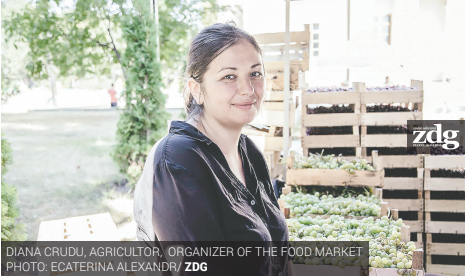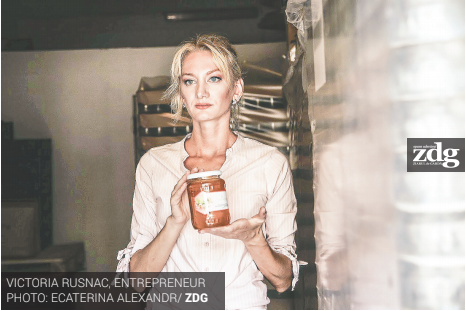
How Moldovan Women Make Their Way in Agriculture

Moldova is an agricultural country, yet the state’s interest in this field is far from the top of the list. Women’s role in agriculture is beyond the priorities, although experts believe that women’s experience in this sector is essential for Moldova’s economy.
According to official data, women represent over 47 percent of Moldova’s labor force. But only 27 percent of them run businesses. However, 20 percent of female entrepreneurs work in the agricultural sector.
“Women deserve a place in the Moldovan agricultural business”
Diana Crudu has 12 years of experience in the agricultural sector – she started a cow farm and decided to diversify her production, later with vineyards. She believes that her agriculture involvement was not her most inspired choice, but she simply cannot leave behind so many years of work and investment.
She was aware of the complicated situation in this field, so she organized in August a fair, selling their harvest. “the fair focused more on women’s work, as I know how difficult it is for a woman to face so many obstacles and to succeed in our society. We wanted to show an example of female solidarity,” says Crudu.
She adds that many women seem to age earlier due to intense physical activity in this area. “There is no alternative, and it is a stressful lifestyle: wake up early, then eight hours of work in the sun, and little financial satisfaction. We simply do not have much choice,” says Diana.
Moreover, the farmer points out that women are paid less than men who work in agriculture. “If a woman gets 250lei (12.8 euros) per day, then a man gets 300 lei (15.4 euros) because he can sometimes carry crates,” said Diana.

Diana believes that the importance of women in agricultural activity is indisputable. “If women stopped working in agriculture tomorrow, no one would do it. We must realize that women remain the most untapped source in Moldovan agriculture. Women deserve a place in the Moldovan agricultural business”, says the fair organizer.
“If we had trusted women, we would have done much more”
Besides her primary job at an NGO, Veronela Pruteanu owns a vineyard that keeps her and the family busy. She says that carrying and cultivating the vineyard is her passion. “It is what keeps us here: the desire to do what we love. If you do not like it in agriculture, you will not be successful,” says Pruteanu.
From her experience, Veronela says that there are endless problems in agriculture; however, she tries not to focus on them. “Initially, I did not have any machinery, but I did my best and got it with a lot of torment. It is easy to say that you support youth in agriculture and everything is excellent when we had to pledge our parents’ house. I committed the tractor and the car too. I also put my salary as a loan payment’s guarantor. We are lucky our parents supported us, but it is still challenging. I had to give up several times, “said the woman.

Women in the agricultural sector have less access to the necessary resources and technical equipment. According to the 2014 survey “Women and men in Moldovan agriculture” carried out by the National Bureau of Statistics (NBS), farms run by women own less than 12 percent of all agricultural machinery.
Moreover, while trying to cope with the production, women-farmers face more problems when it comes to harvest trading. “We do not have a market; we have to stay in markets where there are both intermediaries and producers. People no longer understand who is the producer or the intermediary,” says Veronela Pruteanu.
According to women farmers, the state can solve this problem. It should take concrete action in favor of farmers in general and women-farmers, who face more difficulties due to limited access to production resources and development opportunities.
However, the authorities say that women have subsidy policies. The Agency for Intervention and Payments in Agriculture (AIPA) reminds that women farmers can receive subsidies by 15 percent higher than men.
This measure is not very efficient. Due to the complicated bureaucratic procedure, women rarely go all the way and receive the money. Thus, in 2019, 4476 agricultural producers received support, of which only 819 women-led businesses.
However, Veronela considers that it is not just about state support. She believes that the agricultural sector’s situation will change when society stops doubting women farmers. From her perspective, women have proven they can work in any field “Desire and studies have helped us move forward, including physical work. I think that if we were more open and empowered women, we would be more successful.”
“We hope that things will change after all”
Common agriculture problems have a more substantial effect on women, along with housework and childcare responsibilities.
Victoria Rusnac got used to working at a brisk pace. She wakes up at four in the morning, takes her children to school, and then returns to work. She started her business in agriculture with natural honey and chose the most complicated way – to certify her product so that she would not have to sell it at stalls.
Once, she brought honey mixed with dried fruit at an international exhibition. One of her four children tasted it and liked it, so Victoria started making mixes of honey and berries.
After certification, the most challenging step was to include her product in stores. Otherwise, there are many difficulties to this day. “There are a lot of obstacles, and there is a lot of bureaucracy in our country. On paper, yes, we are backed, but we can only rely on our strength beyond that. We hope that things will change after all, “she points out.

Despite the difficulties, Victoria plans to expand her business. “We want a more extensive production section, and we want to export. Our women are strong, and there would be nothing without them. Everything they plan, they achieve. We have many Moldovan female examples who have successful businesses in other countries, too, “she said.
Gender expert Valentina Bodrug-Lungu points out that women’s role in the agricultural business is decisive. “International studies show that any society is more prosperous when both women and men work along its development process. The most important is to include step by step the idea of partnership, gender partnership, balanced partnership when everyone comes with their contribution, overcoming the stereotypes of what a real man or woman should look like”, says Bodrug-Lungu.
Official data show that 128,000 people worked in agriculture in 2019, of which 46 percent are women, respectively, 58,880 people.












